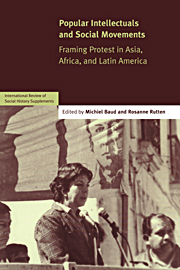Book contents
- Frontmatter
- Contents
- List of Contributors
- Introduction
- Framing, Transnational Diffusion, and African-American Intellectuals in the Land of Gandhi
- Indigenous Communists and Urban Intellectuals in Cayambe, Ecuador (1926–1944)
- Reforming Mysticism: Sindhi Separatist Intellectuals in Pakistan
- Unemployed Intellectuals in the Sahara: The Teshumara Nationalist Movement and the Revolutions in Tuareg Society
- Between Sovereignty and Culture: Who is an Indigenous Intellectual in Colombia?
- Critics and Experts, Activists and Academics: Intellectuals in the Fight for Social and Ecological Justice in the Narmada Valley, India
- Framing Jihad: Intramovement Framing Contests and al-Qaeda's Struggle for Sacred Authority
- Popular Publics: Street Protest and Plaza Preachers in Caracas
- Concluding Remarks: Framing Protest in Asia, Africa, and Latin America
Reforming Mysticism: Sindhi Separatist Intellectuals in Pakistan
Published online by Cambridge University Press: 04 August 2010
- Frontmatter
- Contents
- List of Contributors
- Introduction
- Framing, Transnational Diffusion, and African-American Intellectuals in the Land of Gandhi
- Indigenous Communists and Urban Intellectuals in Cayambe, Ecuador (1926–1944)
- Reforming Mysticism: Sindhi Separatist Intellectuals in Pakistan
- Unemployed Intellectuals in the Sahara: The Teshumara Nationalist Movement and the Revolutions in Tuareg Society
- Between Sovereignty and Culture: Who is an Indigenous Intellectual in Colombia?
- Critics and Experts, Activists and Academics: Intellectuals in the Fight for Social and Ecological Justice in the Narmada Valley, India
- Framing Jihad: Intramovement Framing Contests and al-Qaeda's Struggle for Sacred Authority
- Popular Publics: Street Protest and Plaza Preachers in Caracas
- Concluding Remarks: Framing Protest in Asia, Africa, and Latin America
Summary
Summary: This article examines the revival of Sufism and mysticism by the Sindhi separatist movement in South Pakistan. It explores the emergence of a network of young intellectuals from rural and mostly peasant background, and focuses on two pioneers of Sindhi nationalism and Sun revivalism: G.M. Syed and Ibrahim Joyo. Influenced by Gandhian as well as Marxist ideas on social reform and national identity, these two leaders transformed the annual urs celebration at local shrines into commemorations of the martyrs of Sindh. The article traces their relationship as well as their pioneering role as political leaders, education reformers, and teachers. Analysing their ideas as a particular form of Islamic reform, the article discusses the way they adapted and innovated existing cultural ideas on Islamic nationalism, ethnicity, and social justice.
In the late 1960s and early 1970s a rebellious movement emerged in Sindh, the southern province of Pakistan, which protested against the military regime, and later, after the first democratic elections in the history of Pakistan, called for the independence of Sindh. Although Pakistan is now widely associated with radical Islamist movements and authoritarian military regimes, this Sindhi movement does not fit in this picture at all. Its two main ideologues were a neo-Gandhian, wearing white clothes while writing treatises on the meaning of mysticism, and a Marxist struggling for the moral and social elevation of the local peasant population. The name of the former was G.M. Syed, the latter was called Ibrahim Joyo. The former was a well-known politician during the times of independence and a member of an aristocratic landlord family.
- Type
- Chapter
- Information
- Popular Intellectuals and Social MovementsFraming Protest in Asia, Africa, and Latin America, pp. 65 - 86Publisher: Cambridge University PressPrint publication year: 2005



